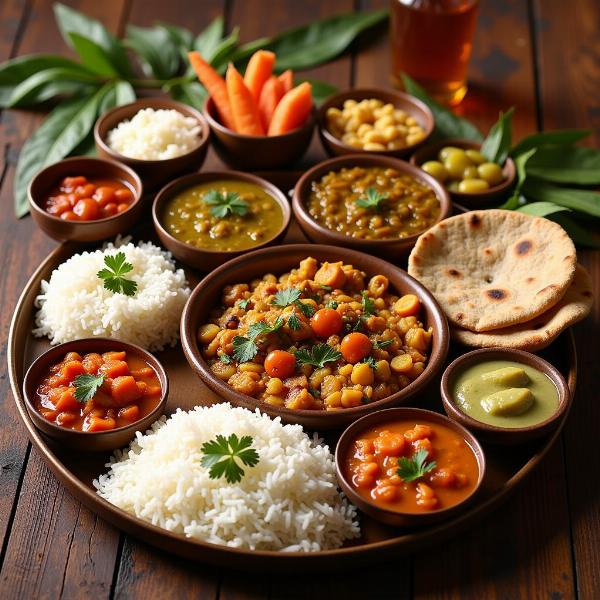Understanding the term “vegetarian” in the Hindi context goes beyond a simple translation. It reflects deeply ingrained cultural and religious values surrounding food and lifestyle choices. This article delves into the various nuances of “vegetarian in Hindi meaning,” exploring its cultural significance and practical implications.
What Does Vegetarian Mean in Hindi?
The most common Hindi word for vegetarian is “शाकाहारी” (shakahari). This term is derived from “shaak” (शाक), meaning vegetables, and “ahari” (आहारी), denoting one who eats. Thus, “shakahari” literally translates to “one who eats vegetables.” However, “vegetarian in Hindi meaning” encompasses a broader spectrum than just consuming plant-based foods. It often implies abstaining from all forms of meat, including poultry and fish.
 Shakahari Thali
Shakahari Thali
The Cultural Significance of Vegetarianism in India
Vegetarianism is deeply intertwined with Indian culture, particularly Hinduism, Jainism, and Buddhism. These religions emphasize the principles of ahimsa (non-violence) and reincarnation, which often extend to dietary practices. Avoiding meat is seen as a way to minimize harm to living beings and maintain spiritual purity.
Religious Influences on Vegetarian Practices
Hindu scriptures often advocate for a vegetarian lifestyle, associating it with sattvic qualities, promoting peace and tranquility. Jainism takes this further, with strict adherence to vegetarianism as a core tenet. Similarly, Buddhism promotes compassion and non-harming, leading many followers to adopt a vegetarian diet.
Different Types of Vegetarianism in India
While “shakahari” is the general term, several variations exist, reflecting varying degrees of adherence to vegetarian principles:
- Pure Vegetarian (शुद्ध शाकाहारी – shuddh shakahari): This signifies strict avoidance of all animal products, including eggs and dairy.
- Lacto-Vegetarian (दूध-शाकाहारी – doodh-shakahari): This diet includes dairy products like milk, yogurt, and cheese but excludes eggs.
- Ovo-Vegetarian (अंडा-शाकाहारी – anda-shakahari): This includes eggs but excludes dairy products.
- Lacto-Ovo Vegetarian (दूध-अंडा-शाकाहारी – doodh-anda-shakahari): This includes both dairy and eggs.
Understanding these nuances is crucial for effective communication and catering to specific dietary needs, particularly when ordering food or hosting guests in India.
Common Vegetarian Dishes in India
Indian vegetarian cuisine boasts an incredible array of flavors and textures. From lentil-based dals and vegetable curries to flavorful rice dishes and an assortment of breads, the options are endless. Popular dishes include:
- Dal Makhani: A creamy and rich lentil dish.
- Palak Paneer: Spinach and cottage cheese curry.
- Vegetable Biryani: A mixed rice dish with vegetables and aromatic spices.
- Roti and Naan: Various types of Indian flatbreads.
Conclusion
“Vegetarian in Hindi meaning” transcends a simple dietary classification. It reflects a profound connection between food, culture, and religion in India. Understanding the various nuances of vegetarianism in the Hindi context allows for respectful communication and appreciation of the rich tapestry of Indian traditions.
FAQ
- What is the Hindi word for vegan? The Hindi word for vegan is “संपूर्ण शाकाहारी” (sampurna shakahari).
- Is it easy to find vegetarian food in India? Yes, vegetarian food is widely available and readily accessible throughout India.
- Are there regional variations in vegetarian cuisine in India? Yes, significant regional variations exist, with each region showcasing unique dishes and flavors.
- What are some popular vegetarian snacks in India? Samosas, pakoras, and various street food items are popular vegetarian snacks.
- Do restaurants in India clearly mark vegetarian options? Most restaurants in India clearly distinguish vegetarian and non-vegetarian options on their menus.
- What is the cultural significance of vegetarianism in India? Vegetarianism is deeply rooted in Indian culture and religion, often associated with principles of non-violence and spiritual purity.
- What is the most common type of vegetarianism in India? Lacto-vegetarianism, which includes dairy but excludes eggs, is the most prevalent type of vegetarianism in India.
Related Articles
About Meaning-Hindi.in
Meaning-Hindi.in is your premier destination for professional Hindi translation services. We specialize in a wide range of translation solutions, including business and commercial documents, legal and certified translations, technical manuals, website localization, educational materials, and expedited translation services. Our expertise in various specialized fields ensures accurate and culturally sensitive translations tailored to your specific needs. Contact us today for all your Hindi translation requirements! Email: [email protected], Phone: +91 11-4502-7584. Let Meaning-Hindi.in bridge the language gap for you.